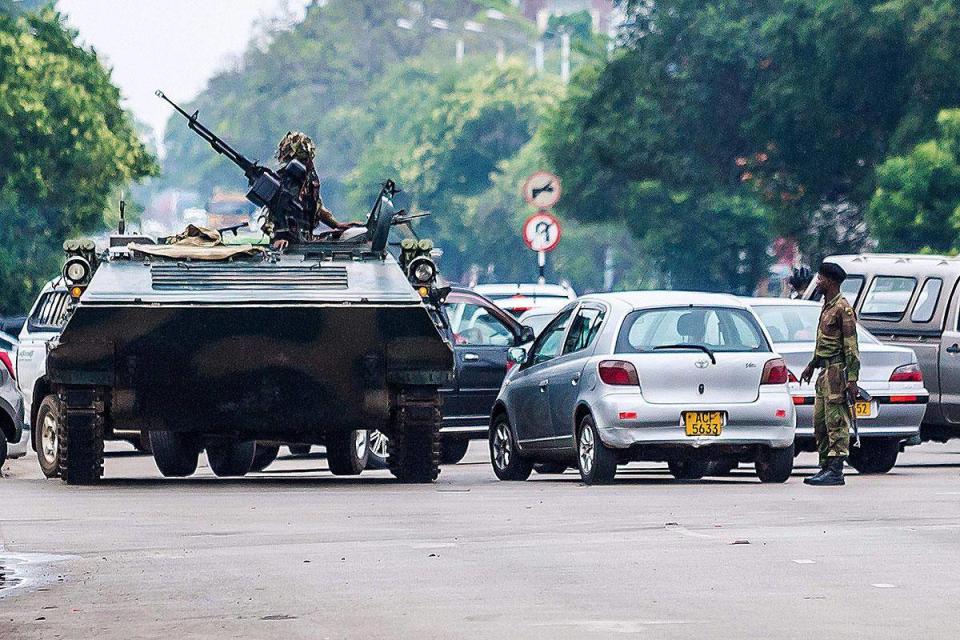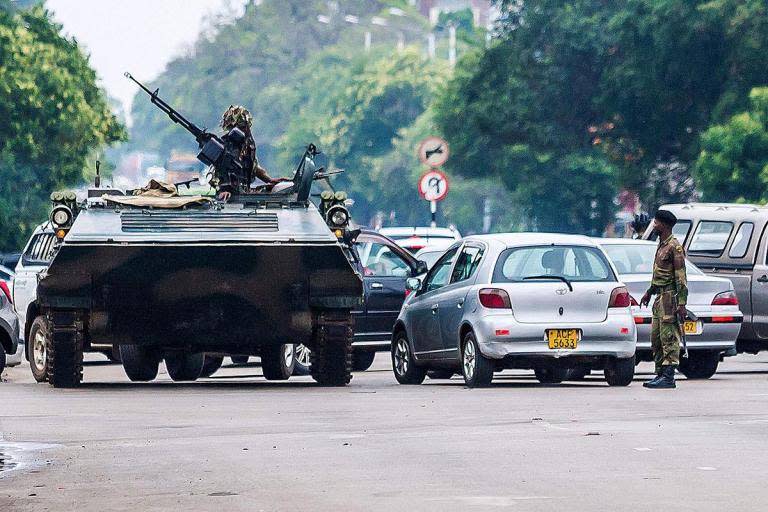Zimbabwe: Military calculates next move after Mugabe loses iron grip on country after 37 years
Zimbabwe is on a knife edge as negotiations continue between military commanders to find a new leader after the army put President Robert Mugabe and his family under house arrest in what could be a dramatic end to the veteran ruler’s reign.
The army’s move began Tuesday night when dozens of tanks rolled into the outskirts of the capital, Harare, while men in uniform took command of the country’s public TV station. On Wednesday morning, Zimbabweans woke up to find military vehicles stationed in the capital’s key intersections, blocking access to many government buildings, including Mr Mugabe’s residence.
Later that morning, the military spokesman, Major General SB Moyo, made a televised appearance to reassure the public. Dressed in military fatigues and reading from a printed statement, he confirmed that Mr Mugabe, 93, was being held in his home but said the president was “safe and sound.” Major General Moyo explained that the army was targeting only “criminals around the president” with the goal of bringing them to justice.
The army's intervention is an unprecedented challenge to a president who has been head of the government for 37 years and whatever happens in the next few days, it will likely lead to the end of his rule. The rift stemmed from the Mr Mugabe appears to be manoeuvring his wife Grace into a position to succeed him. Ms Mugabe is supported by a faction of MPs called G40, but the move was viewed in a dim light by many, particularly after Mr Mugabe forced out his Vice President Emmerson Mnangagwa, who had the support of the military, earlier this month. Known by locals as “The Crocodile,” Mr Mnangagwa is a respected veteran belonged to the “liberation” group that fought for independence in 1980. For decades, he was also the Zimbabwe's chief spy, acting as the intermediary between the ruling party and the nation’s military and intelligence agencies and he was Mr Mugabe's expected successor for a long time.
The 52-year-old Ms Mugabe publicly expressed her willingness to take on the job of president at the time and called Mr Mnangagwa a “snake” that “must be hit on the head.”
On Monday, Zimbabwe Defence Forces commander Constantino Chiwenga, a key ally of Mr Mnangagwa, had given Mr Mugabe an ultimatum to stop purges of officials linked to the exiled politician - before the military then rolled in, taking over the state broadcaster ZBC.
On the streets on Harare, it was mostly calm in the wake of the takeover, with the army keen to express its benign intentions, telling regional leaders its move to seize power was not a coup.
“The military have reassured us this is not a coup d'etat,” Moussa Faki Mahamat, the head of the African Union commission. "The African Union is against any unconstitutional change of government".
Businesses were open and civilians were slowly returning to the streets. There was some panic-buying of supplies like bread and sugar. The political instability is likely to worsen the country’s already frail economy. Zimbabwe is struggling to pay for imports and has been suffering from regular cash shortages. That is why citizens queued to withdraw money from Harare’s main banks.
However, there was also a cautious optimism if the military sticks to its word.
Steven Mutero, a newspaper vendor in Harare was celebrating the army takeover saying it was the only way to stop Mr Mugabe from imposing his wife as the next leader.
“I have read about coups in countries such as Lesotho and Nigeria and military rule is not a good thing but there was no other way for Zimbabwe, ” he said. “Grace Mugabe was now taking advantage of her old and frail husband to rule without our consent. It was a soft coup.. l think the move by the army is worth celebrating.“
There were rumours that Ms Mugabe may have fled the country in the wake of the actions by the military, but the army insisted she was under house arrest with her husband. She had faced constant bad press about her lavish lifestyle and extravagant purchases – including a penthouse and a Rolls Royce – which had landed her with the nickname “Gucci Grace” as well as the ire of many citizens. In August, a model alleged that she had assaulted her with an extension cord in a luxury apartment in Johannesburg. The model pressed charges, which Ms Mugabe denied before being granted diplomatic immunity.
Sources in Zimbabwe said the military top brass were working frantically to put together a transitional authority that will take Zimbabwe to elections. Mr Mnangagwa, who fled to South Africa last week is the military’s preferred candidate to take over from Mr Mugabe and there were indications a couple of former senior Zanu PF leaders had been sounded out for leading roles in the transition.
Leading opposition leader and former prime minister Morgan Tsvangirai, sources said, was also being courted by the generals to deputise Mr Mnangagwa. Mr Tsvangirai worked with Mr Mugabe between 2009 and 2013 in a unity government that temporarily revived Zimbabwe’s economy, he has been in South African hospital for close to a month over an illness.
Opposition politicians appeared to also cautiously welcome the army intervention as Zimbabweans on social media were celebrating the apparent fall of Ms Mugabe
“Are the starving and suffering people of Zimbabwe expected to feel sorry for Mugabe and his dynasty? “Certainly not,” said former deputy prime minister Arthur Mutambara.
“What is important now is to answer the question: ‘How do we collectively work together to reconstruct our country from the ashes that President Mugabe has bequeathed us.
“It is time for thorough reflection, national leadership, vision and strategy.”
Could this military takeover truly lead to democratic transition? It’s not a given, says Jeffrey Smith. The executive director of the pro-democracy non profit Vanguard Africa told The Independent that “Zimbabwe's military has long been a chief impediment to democratic progress in the country” and a true transition would require them to engage in a “genuine dialogue with civil society and the political opposition.” What’s certain is that this military takeover is likely to put an end to the mandate of the world’s oldest president and the only one independent Zimbabwe has ever known.
Neighbouring countries will hope for a solution that does not led to violence on the streets, and the UN has also called for a peaceful transition. In the UK Theresa May called for “restraint on all sides” as the situation was "fluid".
She said the Government's primary concern was the safety of UK nationals in the former British colony, and urged expats in Harare to stay “safely at home” until the situation becomes clearer.
Foreign Secretary Boris Johnson called for "free and fair" elections, but said there may be "hope" for a country whose leader has overseen rampant hyperinflation and unemployment, as well as allegations of political suppression and potential human rights abuses.
"There is hope, there is a real chance now that things will change in Zimbabwe but it's by no means a foregone conclusion," he said.
"Nobody wants simply to see the transition from one unelected tyrant to the next,” he added.


